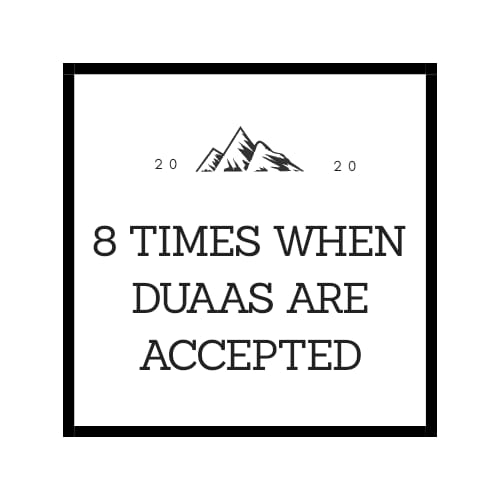1) When rain falls, as it said in the hadeeth of Sahl ibn Sa’d that is attributed to the Prophet (peace and blessings of Allaah be upon him): “There are two which will not be rejected: du’aa’ at the time of the call (to prayer) and when it is raining.” Narrated by Abu Dawood 2)Between the adhaan and the iqaamah. It is narrated in a saheeh report that the Prophet (peace and blessings of Allaah be upon him) said: “A du’aa’ offered between the adhaan and iqaamah is not rejected.” Narrated by Abu Dawood (521) and al-Tirmidhi (212). 3) When drinking Zamzam water. It was narrated from Jaabir (may Allaah be pleased with him) that the Prophet (peace and blessings of Allaah be upon him) said: “Zamzam water is for that for which it is drunk.” Narrated by Ahmad 4&5) It was narrated in a saheeh report that our Prophet (peace and blessings of Allaah be upon him) said: “There are three prayers that are not rejected: the prayer of a father for his child, the prayer of the fasting person and the prayer of the traveller.” Narrated by al-Bayhaqi 6) At a certain time of the night, as the Prophet (peace and blessings of Allaah be upon him) said: “During the night there is a time when the Muslim does not ask for the good of this world and the Hereafter but it will be given to him, and that happens every night.” Narrated by Muslim, 757. 7)A certain time on Friday. The Messenger of Allaah (peace and blessings of Allaah be upon him) mentioned Friday and said: “During it there is a time when a Muslim slave does not stand and pray and ask Allaah for something, but He will give it to him,” and he gestured with his hand to indicate how short that time is. Narrated by al-Bukhaari, 935; Muslim, 852. (most probably between asr and magrib) 8)The Prophet (peace and blessings of Allaah be upon him) said: “The closest that a person is to his Lord is when he is prostrating, so say a great deal of du’aa’ then.” Narrated by Muslim, 482 Discussion on @journeytohajj Instagram
10 Points about the day of Arafat
The day of ‘Arafah is one of the best days of the year, Sayyidna Anas (radiyallahu ‘anhu) says: “The day of ‘Arafah equals 10 000 days in virtue” (At-Targheeb, vol. 2 pg.200 and Lataiful Ma’arif, pg.460) “On the day of Arafah, Allah frees even those who are not physically in Arafah. Therefore the next day is Eid for all” (Ibn Rajab -rahimahullah in Lataiful Ma’arif, pg.482) The Day of ‘Arafah has also been labelled as “Yawmul Eid” by Sayyiduna ‘Umar (radiyallahu ‘anhu) as it’s the day in which Allah Ta’ala announced the perfection of Islam. (Sahih Bukhari) Deeds for this Day DO on the Day of ‘Arafah: 1. Fast2. Recite kalimah shahadah a lot3. Excessive Du’a4. Sadaqah DON’T: 1. Persist on Sin (i.e, make tawbah -repent- from all sins)2. Be arrogantThese 2 types of people are deprived on this blessed day.(Ibn Rajab -rahimahullah- in Lataiful Ma’arif, pg.494) Zikr on the Day of ‘Arafah Rasulullah (sallallahu ‘alayhi wasallam) would recite the following abundantly on the day of Arafah: Lailaha illallahu wahdahu lasharika lahu lahul mulku walahul hamdu biyadihil khayru wahuwa ‘ala kuli shayin qadir (Musnad Ahmad; see Majma’uz Zawaid, vol.3 pg.252) Sayyiduna ‘Ali’s (radiyallahu ‘anhu) dua on the Day of ‘Arafah Allahumma a’tiq raqabati minanar wa awsi’li minar rizqil halal, wasrif ‘anni fasaqatil jinni wal insTranslation: O Allah! Free me from the fire, increase my lawful sustenance, and keep away the transgressive Jin and humans from me.(Ibn Abi Dunya, see Lataiful Ma’arif, pg.494) “Fasting on the day of Arafah will expiate the sins of the past and future year.” (Sahih Muslim) Rasulullah (sallallahu ‘alayhi wasallam) said:“He who protects his ears, eyes and tongue on this day (Day of ‘Arafah) will be forgiven”(Musnad Ahmad with a reliable with a reliable chain, Majma’uz Zawaid, vol.3 pg.251) Shaytan’s Humiliation The day of ‘Arafah is the day when Shaytan is most humiliated (due to Allah’s extensive forgiveness)(Muwatta Imam Malik, Musnad Ahmad and Ibn Majah, Hadith: 3013) Conclusion All of the above will have real significance to us if we implement it and not just sharing it.May Allah Ta’ala grant us all the tawfiq (ability) to practice on all the above and may He bless us with repeated opportunities of physically being on the plains of ‘Arafat. Ameen Discussion on @journeytohajj Instagram
Maximise rewards during Hajj/Umrah
1. Check your intention before carrying out any task. 2. Engage in Zikr (the remembrance of Allah), even when carrying out simple tasks such as purchasing food. 3. When entering or leaving the Masjid, pass on 2 glasses (1 in each hand for convenience)of Zam Zam to elderly folk nearby or anybody else who may ask for it. 4. Remove litter and unpleasant items from the pathways, especially at the mubarak Masjids and the neighbouring areas. 5. Remember to greet other fellow Muslimahs with full salaam and a cheerful smile. 6. Show kindness and motivate other Muslimahs who may be experiencing hardships or simply missing home. Try to ease her plight and gain the pleasure of Allah Ta’ala Insha Allah. 7. Purchase musallahs, tasbeehs or even simply miswaak bundles and distribute to other fellow Muslimahs. Remember that their duas may grant you an accepted Umrah or Haj. 8. Guard yourself and your nafs. Do not take part in Zina. Allah Ta’ala’s curse is on whoever looks and whoever is looked at. Watch your temper and think before you speak. Guard your Ibadat, as the miserable Shaytaan is waiting to ruin us all. Insha Allah, Allah Ta’ala will protect us. Ameen. 9. Purchase Quran’s in the mubarak cities and add these to the shelves at the masjids in Makkahtul Mukarramah and Madinatul Munawwarah. 10. Bottled water is another simple, yet effective way of passing on charity. No act is too small, even in sharing a (kajoor) date will earn you reward, Insha Allah. 11. Make Niyyah when entering the masjid for Allah Ta’ala to please accept your time in the masjid as I’tikaaf and enter with the right foot. 12. Upon donning the Hijab, make Niyyah to Allah Ta’ala to please grant you the thawab of jihad in the path of Islam, to make you an ambassador for Islam, to use you for Dawah of Islam and to protect you from the gazes of strange men. 13. Sponsor a hafez in Madinatul Munawwarah and Makkah tul Mukarramah 14. Ask your guide on how to go about slaughtering an animal with the intention to feed the people, for your thawab or on behalf of somebody else. Discussion on @journeytohajj Instagram
Great rewards for males only
While on our Journey to Hajj – we dont only leave our children behind but we also leave behind aunty Goodness, Thandi and aunty Precious. Did you know that Nabi Sallallahu alayhi wa salaam used to help out with household chores? This is a unique opportunity for all males to assist their wives, mothers, sisters and daughters when on Hajj! Make intention for reviving a Sunnah – rewards multiplied by 50 000 in Madina and 100 000 in Makkah! Here’s how males can help: – Make your bed daily (dont wait for cleaners)– Rinse out your mug after having tea in your room– Take empty water bottles to the masjid and fill zamzam water– Offer to buy basic grocery necessities (it wont harm to offer to take females shopping)– Keep your hotel room neat (socks in laundry bag, kurta to be hung up in the cupboard, wet towels should be hung up etc)Most importantly..If you opt to do washing in your room, wash your own clothes. Spread the Goodness with these Precious reminders! Discussion on @journeytohajj Instagram
Is a Haajis Duas accepted for 40 days?
Question: People have been saying that when one returns home from having completed Haj or ‘Umrah, their dua’s are accepted for forty days. I have never come across this before and am questioning its authenticity. Please can you enlighten me on this matter? Answer: I have come across the following narrations regarding the du’as of a haji: 1) Sayyiduna ‘Abdullah ibn ‘Umar (radiyallahu ‘anhuma) reports that Nabi (sallallahu ‘alayhi wa sallam) said:“When you meet a haji then greet him, shake hands with him and ask him to seek forgiveness on your behalf before he enters his home, for verily he is forgiven”(Musnad Ahmad, vol. 2 pg. 69 with a weak chain. Refer: Majma’uz Zawaid, vol. 4 pg. 16) 2) Sayyiduna Abu Hurayrah (radiyallahu ‘anhu) reports that Nabi (sallallahu ‘alayhi wa sallam) said:“O Allah, forgive the sins of the haji and forgive the sins of the one for whom the haji seeks forgiveness”(Mustadrak Hakim, vol. 1 pg. 441, Sahih ibn Khuzaymah, Hadith: 2516, Shu’abul Iman, Hadith: 3817) Imam Hakim (rahimahullah) has authenticated the above Hadith and Hafiz Dhahabi (rahimahullah) concurs with him. 3) Sayyiduna ‘Umar (radiyallahu ‘anhu) says:“The haji will be forgiven, and all those whom the haji seeks forgiveness on behalf of, for the remainder of Dhul Hijjah, Muharram, Safar until the tenth of Rabi’ul Awwal.”(Musannaf ibn Abi Shaybah, Hadith: 12800 with a weak chain. Refer; footnotes of Musannaf ibn Abi Shaybah. Also see Al Ajwibatul Mardiyyah, vol. 1 pg. 61) Note: I have not come across a narration which specifically states the Haji’s du’a being accepted for forty days, nor have I come across a narration which states that the du’as of one returning from ‘Umrah are accepted for forty days. The last narration I cited, mentions that the Haji’s du’a for forgiveness is accepted till the 10th of Rabi’ul Awwal, which is approximately 90 days from the day of ‘Arafah. And Allah Ta’ala Knows best. Answered by: Moulana Suhail Motala Approved by: Moulana Muhammad Abasoomar Checked by: Moulana Haroon Abasoomar Taken from https://jamiat.org.za/the-dua-of-a-haji-hadith/ Discussion on @journeytohajj Instagram






